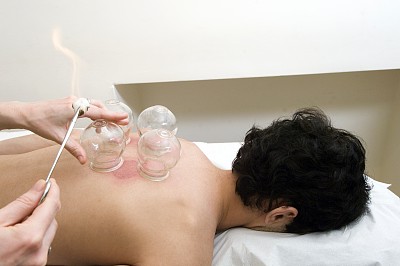Jacinto lee Ziki, 73 years old, lies calmly on his hospital bed with white smoke rising from several needles inserted across his back and waist, while a group of three trainee medical students passing-by shouted through the window.

Male acupuncture patient undergoing cupping. File photo: VCG
"What is that thing burning on his back?" They immediately rushed to the ward to inquire.
When approached, Ziki raised his head up and said, "Don't worry. I'm receiving treatment for back pain." The young medics were thrown into surprise.
After a short while, Tang Jiejie, a Chinese acupuncture doctor working in South Sudan walked in to check on his patient and the students shifted their attention to him, asking series of questions about Traditional Chinese Medicine (TCM).
"I heard about the Chinese doctors two years ago and I have been coming here regularly for treatment of back pain," said Ziki who has suffered prolonged Osteoarthritis for many years.
"I have been enrolled for seven-month acupuncture treatment. My hope is now on the traditional Chinese medicine because I don't have money for operation in India," said Ziki.
Like Ziki, many South Sudanese are now embracing acupuncture since it was introduced to the world's youngest nation by the China medical team in 2016.
Based in South Sudan's biggest public health facility, the Juba Teaching Hospital, the TCM clinic treats patients seeking medication for general joint pain, back pain, tooth ache, stroke and many others.
In another ward just a few metres away from Ziki's, Marith Aldo Reech lies motionless and speechless on his bed. His eyes were the only organs sensitive to any form of movement in the room.
But when the Chinese doctor started pricking his skin with several acupuncture needles, he moved his left leg and hand uncontrollably.
Reech's son, Daniel Deng told Xinhua that his father suffered severe stroke a few weeks ago in the central region of Aweil and that the stroke left his entire body nearly paralyzed.
Luckily, they were referred to Juba Teaching Hospital where Reech received a combination of physiotherapy and traditional Chinese medicine that has helped him regain some sensitivity.
"When I brought my father here. His left hand and leg were paralyzed. He was unable to open his eyes or even eat. But with the joint efforts of the South Sudanese and Chinese doctors, he is now improving," Deng said.
"The Chinese doctors have been giving him medicine every day and that has helped him a lot. I thank the Chinese for their assistance to the people of South Sudan," Deng added.
According to TCM specialist Tang, many south Sudanese do not still understand how the TCM works, but that did not deter them from seeking acupuncture services as he can now treat between 8 and 10 patients per day.
Tang said his clientele of patients seeking traditional acupuncture, cupping and massage is growing on daily basis.
"I think step by step, more South Sudanese people will know more about traditional medicine. I like to help more and more people to relieve their pains," Tang said.
Tang explained that acupuncture is a form of Chinese medicine used to treat body pains and several physical and emotional illnesses through pricking the skin or tissues with needles.
Jacob Pitia, a physiotherapist at Juba Teaching Hospital also agrees that South Sudanese are embracing the TCM since its introduction about two years ago.
"The traditional Chinese medicine received mixed reactions at the beginning. Some people like it and others used to fear the needles. But now we are now seeing an increasing number of people coming for acupuncture," said Pitia.
For the past six years running, China has dispatched five medical teams to the East African nation who offered specialized medical care and surgeries to thousands of patients across South Sudan.
Julia Daniel, 49, who suffered from chronic rheumatoid arthritis in 2016, said she has been a regular visitor of the TCM clinic in Juba after being introduced to the Chinese doctors in 2016.
Daniel told Xinhua that the Chinese medicine has improved her health and she can now perform domestic duties without difficulties.
"This is the second time for me to come for the acupuncture treatment. I first got Chinese treatment in 2016 in Egypt. Their medication reduced the pain and I can now move my hands without difficulty," said Daniel.
"I urge the people of South Sudan to seek medication from the Chinese doctors because they are helping a lot. They prick the painful areas and I get real medication from the Chinese doctors." Daniel said.


